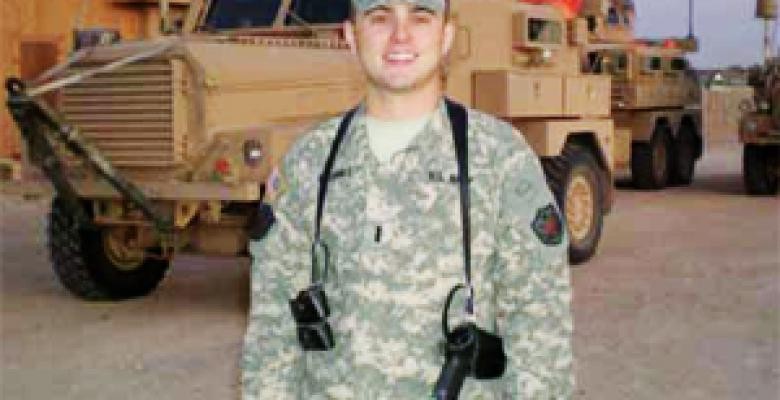Brian Mulhall, From the Navy to the Law

Brian C. Mulhall, who is graduating from the Law School, learned a lesson in a middle school summer wrestling program that became central to the way he approaches life. You cannot always control opportunities, his coach told him, but you can control your attitude and what you do with whatever comes your way.
In five years of military service in the Navy and over the past three years at Columbia Law School, Mulhall has made great use of opportunities that have landed him a job in the National Security Division at the Justice Department after he graduates in May.
“I’ll be working alongside many of the country’s best trial lawyers, and I know I have my work cut out for me,” he said.
The job comes on the heels of a law school externship this past semester in Washington, D.C., in the Office of the Legal Adviser at the State Department. Mulhall worked there on international law enforcement issues, including extradition cases and treaty research, as well as employment law in the diplomatic field.
“It was incredibly interesting to me to see the prominent role that lawyers play in helping policy makers navigate the intersection of foreign policy, international law, domestic law, and a whole host of other competing interests,” he said.
Mulhall is understandably reticent about talking about his governmental work due to its confidential nature. He has no such qualms about discussing his law school experience. “Being in an environment with classmates and faculty who are performing at such a high level made me strive to meet expectations,” he said. In his first year, he was named a Harlan Fiske Stone Scholar and in his second, a James Kent Scholar, both given for exceptional academic achievement.
One particularly influential course he took was a national security seminar with Professor Matthew C. Waxman that featured prominent guests such as the judge advocate general of the Navy, Vice Admiral James W. Houck.
During his second year, Mulhall joined the Environmental Law Clinic, where he headed to Harrisburg, Penn., to attend a hearing over hydraulic fracturing to drill for natural gas, also known as fracking. He met there with parents who told how toxic wastewater had sickened their children. “I was proud to represent the towns that were willing to stand up to the oil and gas interests for the sake of their kids’ safety,” he said.
Mulhall was a freshman at the University of Notre Dame when the Sept. 11 attacks occurred. The college canceled classes and held an outdoor mass for over 10,000 people. “In the days and weeks afterward, that event got me started thinking about military service,” Mulhall said.
In his senior year at Notre Dame, he turned down an offer to work in investment banking at Citigroup, hoping to become an intelligence officer in the Navy instead, but wound up joining as a logistic officer.
His post-college military training was arduous. He recalls challenging field exercises with his Navy construction battalion, and joked that he was glad he never joined the aggressive water polo games that attracted the likes of Navy SEALs and other special warfare operatives. “I probably would have ended up getting pulled out from the bottom of the pool.”
His interest in law school increased when he witnessed his boss, Air Force Brig. Gen. Gregory Brundidge, preparing for negotiations with Iraqi officials over certain terms in the U.S.-Iraq security agreement. “During those preparations, a mid-level military lawyer gave a really tactful and persuasive presentation. He gained my boss’s attention in a way that was unusual for his rank,” he said. Mulhall was in Baghdad assisting Brundidge, who was the senior communications and information systems officer for coalition forces in Iraq.
With his work in the law and military, Mulhall has witnessed power up close, and never more so than when he was one of a small group of service members selected to stand behind President George W. Bush in Al Faw Palace in Baghdad when the commander in chief gave a farewell speech near the end of his presidency.
Mulhall was also present when President Barack Obama (CC’83) made his first trip to see the troops in Iraq. “There was no podium and there was a rock band playing,” recalled Mulhall. “He had more of a rock star persona having just made history on the campaign trail.”
The pressures of military service will likely be good preparation for working in the executive branch and perhaps this time, meeting the president while in civilian clothes.